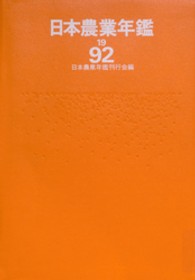基本説明
The contributions explore issues including the use of force, governance, regionalism and the releance of the UN.
Full Description
Since the creation of the United Nations in 1945, international law has sought to configure itself as a universal system. Yet, despite the best efforts of international institutions, scholars and others to assert the
universal application of international law, its relevance and applicability has been influenced, if not directed, by political power.Today, the "decline of the West" and ascent of China and India poseparticular challenges for international law and institutions. The international system appears to be moving towards multipolarity, with various sites of power competing to exert influence in the world today.
With contributors from a variety of countries providing perspectives from the disciplines of international law and international relations theory, International Law in a Multipolar World addresses the implications that multipolarity poses for the international legal system. Contributors including Jean d'Aspremont, Jörg Kammerhofer, Alexander Orakhelashvili, Christian Pippan and Nigel White, explore issues such as the use of force, governance and democracy, regionalism and the relevance of the United Nations in a multipolar world, while considering the overarching theme of the relationship between power and law.
International Law in a Multipolar World is of particular interest to academics and students of public international law, international relations theory and international politics.
Contents
Introduction, Matthew Happold 1. The Security Council, the Security Imperative and International Law, Nigel D. White 2. Ascertaining Inchoate Threats to International Peace and Security, Isobel Roele 3. Nuclear Non-Proliferation and the UN Security Council in a Multipolar World: Can International Law Protect States from the Security Council?, Daniel H. Joyner 4. Using Force in International Affairs: the Role of International Law in Contemporary International Politics, Dominika Švarc 5. Russia and the Competing Spheres of Influence: the Case of Georgia, Abkhazia and South Ossetia, James Summers 6. Hegemony, Multipolarity and the System of International Law, Alexander Orakhelashvili 7. Orthodox Generalists and Political Activists in International Legal Scholarship, Jörg Kammerhofer 8. Basic Rights and Global Justice: The Problem of International Coercion, Silviya Lechner 9. The Duality of the Legitimacy of Global Actors in the International Legal Order, Jean D'Aspremont and Eric de Brabandere 10. Democracy as a Global Norm: Has It Finally Emerged?, Christian Pippin 11. International Law and East Asia's Regional Order: The Strengthening of a Fundamental Institution, Pablo Pareja-Alcaraz 12. Post-Soviet States and International Law in a Multipolar World, Rima Tkatova 13. Universality, the UN and the Organisation of the Islamic Conference: Single, Complementary, or Competing Legal Orders?, Katja Samuel 14. The Development of Self-Contained Regimes as an Obstacle to UN Global Governance, Carmen Draghici 15. The Relationship between Community Law and International Law after Kadi: Did the ECJ Slam the Door on 'Effective Multilateralism?, Aurel Sari








